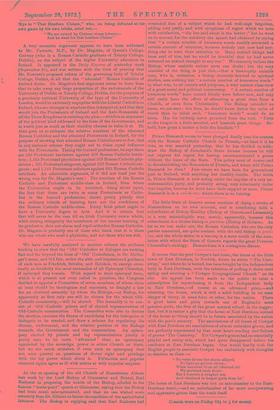At the re-opening of the old Church of Duntsborne Abbots
last week by the Lord Bishop of Gloucester and Bristol, Earl Bathurst in proposing the health of the Bishop, alluded to the famous "horse-pond" speech at Gloucester, saying that the Bishop had been much misrepresented, and that no one wished more earnestly than Dr. Ellicott to better the condition of the agricultural labourer. The Bishop in replying said that Earl Bathurst had reminded him of a subject which he had well-nigh forgotten, adding very justly, and with symptoms of regret which we note with satisfaction, "the less said about it the better ;" but he went on to account for the notoriety the speech had obtained by saying that "a certain number of humorous words readily attracted a certain amount of attention, because nobody just now had any- thing else to turn their attention to. Many unkind things had been said of him, but he could be thankful that he had never returned an unkind thought to any one." We sincerely believe the Bishop, whose amiable nature none can doubt; but the very mischief of the thing is just this,—that a thoroughly amiable man, who is, moreover, a bishop sincerely devoted to spiritual studies, sees nothing but "a certain number of humorous words" in what was, to all intents and purposes, a very narrow class-view of a great social and political controversy. "A certain number of humorous words" have caused bloody wars before now, and may still easily have the effect of alienating a great class from a Church, or even from Christianity. The Bishop intended no harm, we are sure ; but then, he should know better the value of words than to think such "humorous words" would do no harm. Has his lordship never preached from the text, "Even so the tongue is a little member, and boasteth great things. Be- hold, how great a matter a little fire kindleth "?


































 Previous page
Previous page